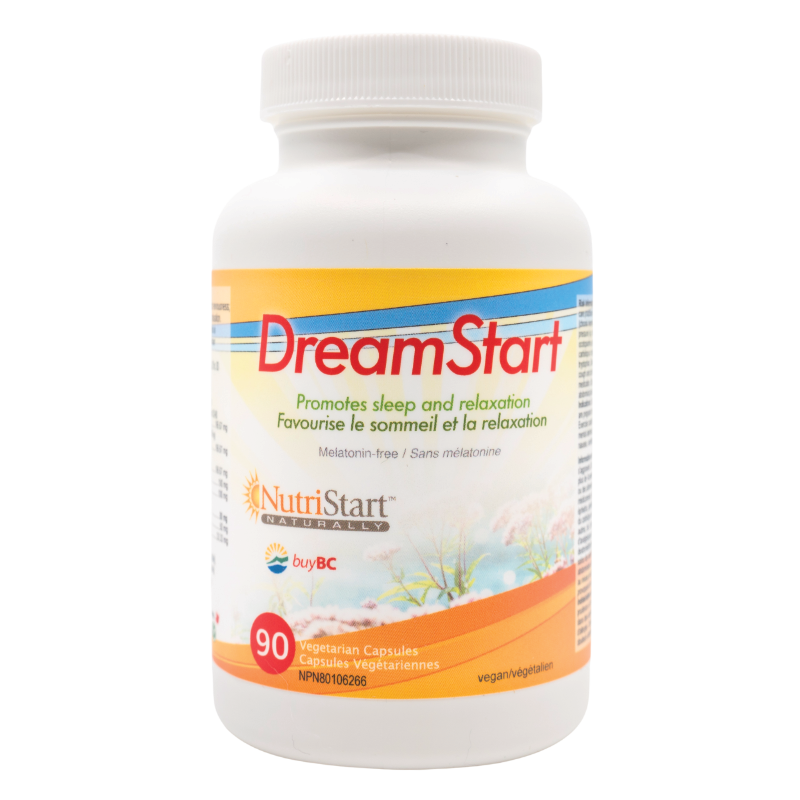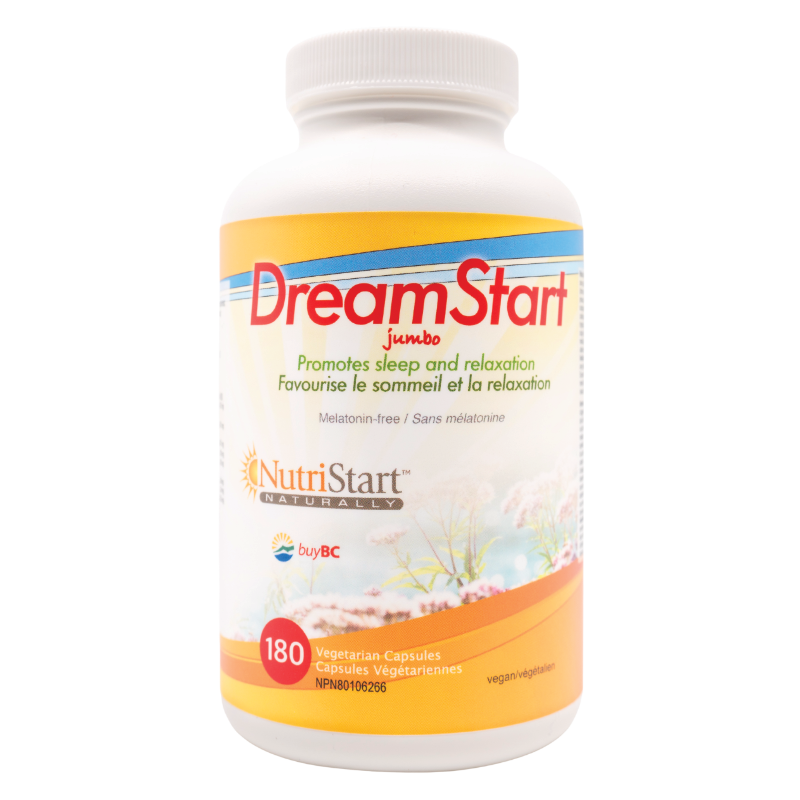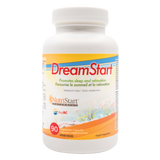

DreamStart
Regular price
$39.99
Regular price
Promotes Sleep & Relaxation
Given the widespread prevalence of sleep disorders, NutriStart is pleased to bring to market a new sleep product, composed of safe, natural compounds. Our DreamStart product combines the most powerful nutraceuticals, scientifically proven to aid in sedation and sleep. Included with these nutraceuticals are those herbs with the best track record for helping to induce restful sleep, herbs which now have scientific evidence to support centuries of traditional use.
Nutraceuticals & Herbs
Nutraceuticals
- 5-HTP (5-hydroxytryptophan) - This compound is derived from the African plant, Griffonia simplicifolia. It is a naturally occurring amino acid which is the intermediate step between tryptophan and the calming neurotransmitter serotonin. Thus, 5-HTP safely and effectively boosts serotonin levels and may offer benefit in many conditions linked to low serotonin levels, including headaches, migraines, and symptoms of fibromyalgia.
In today’s busy world, low serotonin levels are commonplace due to people's increased stress, anxiety, and poor diet, as well as over-exposure to EMFs. Serotonin is involved in the regulation of several processes within the brain including, anxiety, appetite, depression, memory, mood, and sleep. And indeed, several clinical studies have shown 5-HTP to produce good results in promoting and maintaining sleep in normal subjects, as well as those experiencing insomnia. (Study)
- GABA (Gamma aminobutyric acid) - GABA is the main inhibitory neurotransmitter of the central nervous system, and as such, GABA will lessen the ability of a nerve cell to receive, create, or send, chemical messages to the other nerve cells. As a result, it is well known for producing a calming effect and plays a major role in controlling anxiety, fear, and stress. And, it has been established that GABA encourages restful sleep, so well-established that three generations of drugs for inducing sleep are based on influencing GABA receptors (including barbiturates and benzodiazepines). (Study)
- L-Theanine - L-theanine, an amino acid found in green tea, has been shown to affect brain functions by relieving anxiety and depression, improving mood, and maintaining normal sleep. But, the effect of L-theanine on brain function doesn’t stop there: L-theanine has also proven helpful in treating cognitive loss, dementia and Alzheimer’s disease. (Study)
It has also been used to treat high blood pressure (especially the type that is stress-induced), post-traumatic stress disorder, substance dependence, carbohydrate cravings (as part of a weight loss program), and even attention-deficit/hyperactivity disorder (ADHD). In fact, one study demonstrated that “L-theanine is safe and effective in improving some aspects of sleep quality in boys diagnosed with ADHD”. (Study)
- L-Tryptophan - In both animal and human studies, “subjects with mild insomnia all demonstrate that L-tryptophan reduces sleep latency”. Sleep latency is the time it takes a person to fall asleep after turning the lights out. Studies have also determined that L-tryptophan, unlike pharmaceutical sleeping drugs, does not negatively affect the sleep cycle with long term use, nor does it become habit forming. (Study)
While inducing sleep with tryptophan alone can require levels of 1 gram or more, in DreamStart, a small amount of tryptophan works synergistically with other serotonin precursors (5-HTP, L-theanine) to attain the same result.
Herbs
- Lemon Balm - A member of the mint family, lemon balm (Melissa officinalis) has been used since the Middle Ages to treat anxiety, stress, and sleep disorders. Clinical studies have confirmed the ability of lemon balm to serve these functions along with having antiviral properties, and improving cognition, memory and mood.
In one study, lemon balm was found to be particularly effective in reducing severe anxiety and promoting healthful sleep among stressed volunteers, with mild-to-moderate anxiety disorders and sleep disturbances. In this study, 95% of subjects responded to treatment, of which 70% achieved full remission for anxiety, 85% for insomnia, and 70% for both. (Study)
- Passionflower - Passionflower (Passiflora incarnata) is a traditional herbal sedative, long used in Europe to treat anxiety and insomnia. In other parts of the world, passionflower has also been used to reduce pain, treat asthma, as a vermifuge (kills parasites), for burns and hemorrhoids, and for opiate drug withdrawal. (Study)
The effectiveness of passionflower for sleep disorders is well-illustrated by a study that only used the tea form of the plant. A simple water extract is the weakest form of herbal therapy, so the fact that a tea can work, indicates a powerful level of effectiveness from this herb: “These initial findings suggest that the consumption of a low dose of Passiflora incarnata, in the form of tea, yields short-term subjective sleep benefits for healthy adults with mild fluctuations in sleep quality.” (Study)
- Skullcap - In China and Japan, skullcap has been used for centuries for its anti-inflammatatory, anti-bacterial, anti-hypertensive, anti-allergenic and sedative properties. Considered by herbalists to be a “nervine”, skullcap (Scutellaria baicalensis) has the ability to restore and rebuild the central nervous system. It is used to treat conditions of depression, drug withdrawal, mental exhaustion, as well as PMS. Known to calm an over-active mind, the sedative effects of skullcap makes it a perfect addition to natural sleeping formulas, and it is commonly used this way in European countries. Recently, modern science has confirmed the ability of skullcap to regulate sleep cycles. (Study)
- Valerian Root - The herb valerian has been traditionally used as a sleeping aid for centuries, and to this day it is a common ingredient in natural over-the-counter sleep medications. Studies have confirmed that those taking valerian fell asleep faster, slept more deeply, and awoke less groggy, than those on a placebo. (Study)
One study, done on menopausal women with sleep disorders, found that the combination of valerian with lemon balm worked extremely well. (This particular combination is commonly found in over-the-counter sleep formulas in Europe.) The study concluded that: “A significant difference was observed with reduced levels of sleep disorders amongst the experimental group when compared to the placebo group.” (Study)
Sleep and Adrenal Fatigue
In the alternative healing field it is believed that those who consistently wake at roughly 3 a.m. are suffering from adrenal burn-out. For such people, taking a good adrenal tonic for a couple of months can get them back to sleeping through the night. Therefore, if this is a situation you find yourself in, you might wish to try our AdrenalStart product, in conjunction with DreamStart.
DreamStart for Anxiety
Since all the ingredients used in DreamStart are involved in raising levels of inhibitory neurotransmitters, this product can also be used at a low dose to treat daytime anxiety. As with most medications that are sedating, each person has to find their ideal dose. So for example if three caps of DreamStart are sufficient to aid one in falling asleep, then one cap may be enough to calm an agitated nervous system. However, DreamStart should not be taken by those using pharmaceutical mood altering drugs (e.g. SSRIs), without the advice of a health professional.
DreamStart Dosage: between 1-3 capsules (depending on body weight and severity of sleep issues), 30-15 min before bed.
Ingredients per capsule:
5-HTP…………………………………………33 mg
GABA………………………………………….100 mg
L-Theanine……………………………………80 mg
L-Tryptophan…………………………………50 mg
Lemon Balm (10:1 extract)..........................100 mg
Passion Flower……………………………….167 mg
Skullcap……………………………………….167 mg
Valerian Root (0.8% valerenic acid).............167 mg
Health Canada License NPN
Health Canada License for Children NPN

DreamStart
Recently Viewed

DreamStart

DreamStart

DreamStart

DreamStart

DreamStart

DreamStart

DreamStart

DreamStart

DreamStart


